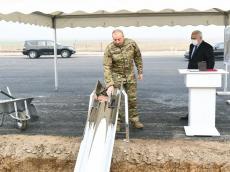|
|
TODAY.AZ / Society
Creating a new transport hub in Karabakh
20 February 2021 [12:40] - TODAY.AZ

If you live in a town where trains pass nearby, I suggest watching the
romantic movie “Mona,
l'étoile sans nom” (1965). Putting the film’s
main plot to one side, the events that happen around the town’s train station won’t
fail to leave an impression on anyone.
The whole town’s social life is tied to one passenger train passing
through each day at the same time. The residents of the town put on their best
clothes and come to the station. Young women comb their hair, young men polish
their shoes, and schoolchildren tear away from their classes to have a look - not
at the train itself, but the people on the train.
Maybe this film affected me so profoundly because my childhood was spent
in the station-town of Minjivan, Zangilan, where many passenger trains passed. The
heart of this town, and the station of the same name, was beating with the
passing trains. Almost the whole life of our town was connected with the
railway and trains.
My father worked as the head manager of a rail line. But he was not the
only resident who saw his life and future so tied to the railway. In Minjivan,
almost eighty percent of men were railway workers, worked on trains or railway
infrastructure.
Located at the crossroads of two major international transport corridors,
North-South and West-East, Azerbaijan has played the role of a unique bridge
for centuries. The 140-year-old (1880-2020) Azerbaijani railways passed through
our small settlement as part of the International Transport Hub. The Minjivan station was divided into several lines,
from Moscow to Tehran, Yerevan to Tbilisi, and Baku to Qafan. As trains
carrying people from those inaccessible cities passed through our town, we too
felt we were part of this massive transportation road.
It was as if we were part of not only this road, but also of the long
history of the railway, a considerable process that began with the oil boom in
the Absheron peninsula, more than a hundred years old at that time.
The First Karabakh War destroyed countless wonderful things, this road
being only one example of what was put an end to, cut down, and demolished.
On October 23, 1993, at 23:40, the last Baku-Gafan train departed. The
train, which reached Imishli station at 4.10 in the morning, was not permitted to
leave. Zangilan was under Armenian occupation, and if the train continued, it would no longer go to flourishing
Minjivan but to the center of the conflict. This train line, one of the leading
transport arteries in the region, was officially cut off due to the Armenian
occupation later that day. In this way, more than 240 km of railway lines were
subjected to Armenian control. The trains in the Mehri-Frame area were
suspended, and as a result, the Nakhchivan Autonomous Republic was isolated
from the country and under blockade, as it has been now for more than 27 years.
But the days are not far away when the Second Karabakh War’s victory
will heal the wounds of the First Karabakh War.
Recently, Hikmet Hajiyev, Assistant to the President of Azerbaijan -
Head of the Foreign Policy Department of the Presidential Administration,
together with foreign diplomats in Azerbaijan, visited the liberated
territories. During this visit, Mr. Hajiyev said that the regional transport
hub in Minjivan would be restored.
On February 14, during a trip with First Lady Mehriban Aliyeva to
Fizuli, Zangilan, Lachin and Jabrayil regions, President Ilham Aliyev laid the
foundation of the Horadiz-Zangilan-Agbend railway.
“This railway is of great strategic importance. First of all, because it
will be of great importance both for the travel of citizens and for cargo
transportation. On the other hand, this road will lead to Nakhchivan. The joint
statement signed on November 10 contains a special provision on the creation of
the Nakhchivan corridor. This work has already started. I am sure that this
project, carried out on our initiative, will be realized. After a long break,
Azerbaijan and its inseparable Nakhchivan Autonomous Republic - will be
connected to each other by rail, and thus our strategic, economic and political
goals will be realized,” Aliyev said.
The Republic of Azerbaijan today is turning into an international
transport hub. Investments and the political
will of country’s leadership create tremendous economic opportunities for
logistics. Railway routes will pass from east to west and north to south
through Azerbaijan. This will give momentum to development and create new jobs and
economic opportunities for all countries in the region.
The North-South Transport Corridor was laid on the basis of the
intergovernmental agreement signed between Russia, Iran and India on September
12, 2000. Azerbaijan joined this agreement in 2005. In total, 13 countries have
ratified the agreement (Azerbaijan, Belarus, Bulgaria, Armenia, India, Iran,
Kazakhstan, Kyrgyz Republic, Oman, Russia, Tajikistan, Turkey and Ukraine). The
corridor aims to reduce the delivery time of cargo from India to Russia and to northern
and western Europe (at present, delivery time on this route is over six weeks,
but it is expected to be three weeks via the North-South Transport Corridor).
Another important corridor in which Azerbaijan will play a key role is
the East-West Railway Corridor. The main connecting link of this corridor is
the Baku-Tbilisi-Kars (BTK) railway project. Azerbaijan is both an initiator
and financial donor of BTK.
The East-West line, or The
Trans-Caspian International Transport Route (TITR), is intended to grow freight traffic from China to Turkey and from
the countries of the European Union in the opposite direction. A consortium
established by participating countries carry out the management and development
of this transport route. The block train, the “Nomad Express” on this route,
delivers goods from China to Europe within 10-12 days on average. This speed is
one of the main advantages of this transport corridor.
It is not difficult to understand how this news affected me. After thirty
years, I am still a part of the road, history, and process that I was a part of
as a child.
At the end
as Guy de Maupassant says in his famous novel A Life “After all, life is never so jolly or so
miserable as people seem to think.”
Aybaniz Ismayilova,
Head of the International Relations Department
Azerbaijani Community of the Nagorno-Karabakh Region of the Republic of
Azerbaijan

URL: http://www.today.az/news/society/203633.html
 Print version
Print version
Connect with us. Get latest news and updates.
See Also
- 23 February 2026 [15:16]
Azerbaijan, Iran hold 17th meeting to boost trade and transport cooperation - 23 February 2026 [14:21]
Azerbaijan’s ASAN Application response rate reaches 80% - 23 February 2026 [14:10]
President Ilham Aliyev approves UN Convention against Cybercrime - 23 February 2026 [13:50]
Azerbaijan set to review minimum wages annually - 23 February 2026 [11:22]
Ammunition to be destroyed in Pir?k??kül and A?d?r?, Defense Ministry Says - 23 February 2026 [10:43]
Institute of Manuscripts to host conference on women in science - 23 February 2026 [10:00]
Azerbaijan Embassy in Mexico issues security advisory amid unrest in country - 22 February 2026 [18:00]
Turkic States forge new path for winter tourism and ski resorts - 22 February 2026 [17:10]
State Pedagogical University holds meeting with student leaders - 22 February 2026 [16:15]
Internet speed in Azerbaijan to be measured more accurately
Most Popular
 China, Iran, Russia to hold Middle East drills
China, Iran, Russia to hold Middle East drills
 TURKPA and OSCE PA discuss expanded cooperation at 25th Winter Session in Vienna
TURKPA and OSCE PA discuss expanded cooperation at 25th Winter Session in Vienna
 Poland bans Chinese cars from military facilities
Poland bans Chinese cars from military facilities
 Azerbaijan aligns with China’s Belt and Road strategy through Middle Corridor
Azerbaijan aligns with China’s Belt and Road strategy through Middle Corridor
 Europe seeks energy independence as Azerbaijan advances Black Sea green power corridor [COMMENTARY]
Europe seeks energy independence as Azerbaijan advances Black Sea green power corridor [COMMENTARY]
 Trump weighs military strike on Iran as Pentagon presents options
Trump weighs military strike on Iran as Pentagon presents options
 Eight Hezbollah members killed in Israeli airstrikes in Eastern Lebanon
Eight Hezbollah members killed in Israeli airstrikes in Eastern Lebanon
